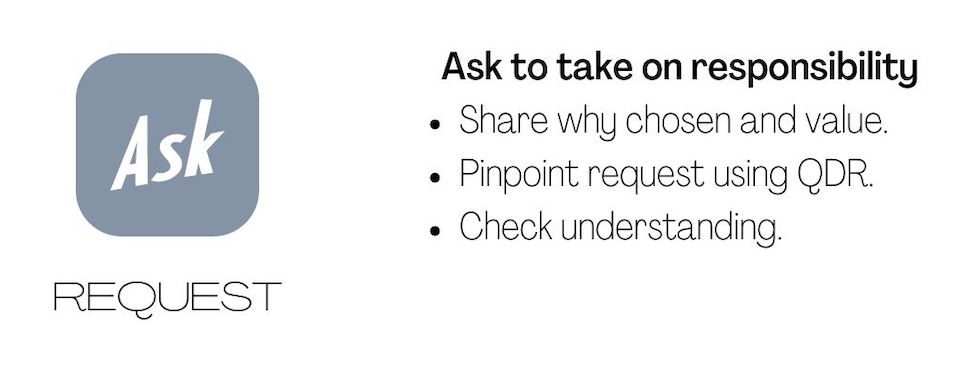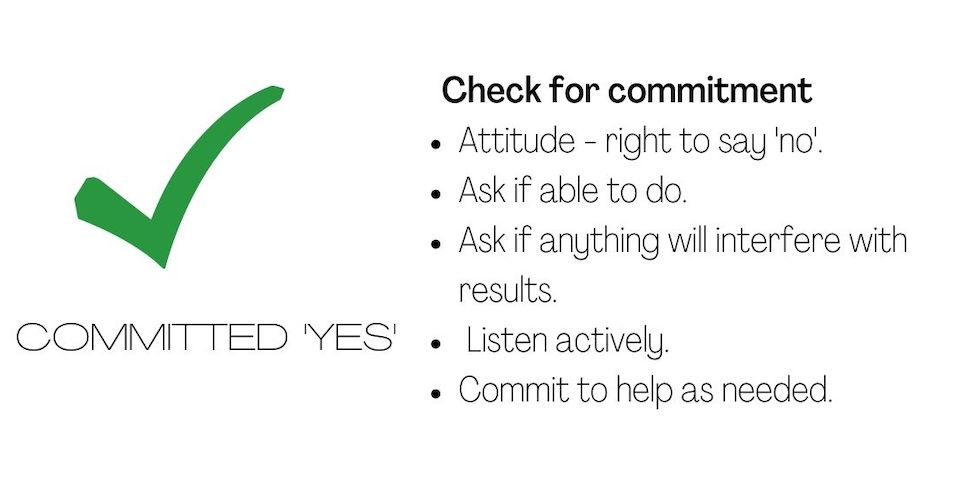Delegating is a process that starts with asking yourself questions and ends with the results you wanted.

Choosing what to delegate
As an MM you will always have a long list of things to get done. Many of those things can be done by someone else. And some have to be done by you. Make a list and sort them accordingly.
Prioritize the things to delegate and then put some meat on the bones. You want to be clear on exactly what you want done. You will use this information to pinpoint your request later in the process.
Having decided on what responsibility you are going to ask another person to take on responsibility for (delegating) , you must answer the question: what exactly is it that you are delegating?
A helpful way of pinpointing what you want to delegate is to think about:
Task and scope – what do I want done?
Quality – what will a successful task completion look like?
Time – when will I ask for it to be completed?
Budget – how much money, other resources including people will I provide
Authority – What decisions can be made without approval and what must be passed to me for others for decision?
I have been guilty of delegating without pinpointing and it caused me trouble. I asked a team member to give me a report on a project status which I needed for a board presentation I was to make on the upcoming Friday. I asked my staff member to get the report to me by Wednesday 5 p.m. latest. He said ‘yes’. Delegation done!!
Come late Wednesday I went to check on the report as it had not arrived. I went to his workplace and asked whether it was done and and the reply I got was, “almost – only 3 more slides to finish!!”.
I did a double take. Why? Because I was expecting a one pager with factual bullet points!!
And it struck me then that I never told him that! I was wrong. But he was wrong too, as he did not ask what I was expecting.
“Give me a report by Thursday at 5 pm. latest” is not pinpointing!!
“Give me a one page bullet list on the key progress and any issues with Project x by Wednesday 5 p.m at the latest. I do not need explanations, just factual statements.” is pinpointing.
Adding the backstory “I need it as part of a Board report I have been asked to give on progress with implementing the new systems to support our product strategies and Project x is one of those”, helps give the person context and meaning which will help them when doing the task.
Be clear on task scope, time, quality, budget and authority for tasks you are delegating. Some tasks will need a lot of detail, others will be quite simple. What can be more simple than asking for a report?
As I discovered, even that simple request needs to be thought through.
The first step then is to THINK

To whom?
It is useful to think of those to whom you will delegate as falling into 3 categories:
Full trust: the person capable of doing the work and will do everything to have it done on time.
further more if they run into a problem they will let me know. These are often a MM’s ‘go to’ people and delegating to them is (too) easy. Beware of overloading them.
Semi trust: the person is capable of doing the job but commitment to quality and time has not been historically a strength of theirs. If you choose to delegate to this type of person you need to advise them that you will follow up and diarize the follow ups so you do not forget. Action speaks louder than words so making the follow ups will let them know that you are serious about the task and the dates. When you do follow up ask for proof of progress. This will be different in each case. A report – show me what you have done so far? A collaboration – who have you spoken to and what was their response? Research – show me what you have found so far? You get the picture.
Trust but….: This person is one who is keen to learn and do well. BUT, maybe they have not done what you are asking for before or have little experience with that type of work. Your responsibility to them in delegating to them is to provide support as you recognize there is some learning needed.
The support might come from you in the form of coaching, or you might ask someone who has a black belt, as it were, in the work you are delegating, to coach them through the task. The one thing to remember in this coaching effort is that the person you have delegated to must do the work. Coach but do not take over! If you take over the task then they have not learned.
Step Two REQUEST

As you ask someone to take on the delegated responsibility in this step be sure to:
1. Pinpoint what you are delegating. – task, quality, time, budget and authority. Even as simple an ask as buying pizza for an office celebration will involve all five aspects. Authority might be on deciding on toppings, or size or source.
2. Ask if there are any questions about the ask that they need answered. And answer them.
3. Ask the person to feed back to you their understanding of what you have asked. This can be as simple as asking “Just to make sure I communicated this request fully, please tell me what you heard?”, or whatever words work for you. I guarantee that sometimes the answer will surprise you. This checking understanding is more important the more complex the request.
Step Three CHECK FOR COMMITMENT

A person cannot really say ‘yes’, with commitment, if they do not have the right to say ‘no’.
Especially in cultures where saying ‘no’ to a more senior person is unacceptable. The more command and control the culture is in which you work, the more important this step becomes.
You do not want to know that someone meant ‘no’ on the day the deliverable is due. “You want to NO ahead of time”
To do this you need to make them comfortable that you are OK with hearing pushback. Some ways of doing this is to ask questions:
– “Is there anything that will prevent you from being able to get the job done?” I have experienced replies going from being on holiday to ‘I am resigning,’ so do not be surprised.
– “How much time will this take? When will you be able to fit that in?“ People are busy and maybe they do not have space in their calendar for the task you are delegating. Be open to helping them with reprioritization if necessary, or help them think through the amount of time the task will take. Coach on planning time usage, if necessary.
– “It is really important that the task is completed by (date/time). Will you be able to dedicate the time needed?” This is a general type of question that can bring up a wide range of issues.
Remember that the person you delegate to might not be thinking about how they will get it done. Mostly they are thinking something like ‘Wow this is going to be hard to get done with all that I have on my plate. Why pick on me? Does she know how busy I am?”
It is better to NO ahead of time.
Confirm – Agreement and Support
You have communicated clearly what is being delegated. You have tested and obtained a committed ‘Yes’. During the conversation you might have made promises – to coach or provide resources or to adjust priorities or whatever you felt was right to promise.
This step is simply the close: Thank them for committing to the responsibility delegated, summarize the task and confirm pin pointedly what promise to do.
Remember to diarize anything that you have promised that relates to checking in or coaching.
Final Step FOLLOW UP

Following through on your promises is important is you wish to get the results you need.
Delegation is successful only if the results you wanted in the first place have been achieved.
Actions this week:
Action 1: What am I delegating this week – make sure that you pinpoint the details of your request.
Action 2: When you delegate this week ensure that you NO ahead of time if a ‘yes’ is a committed yes or not.
Next week: Planning you Day

